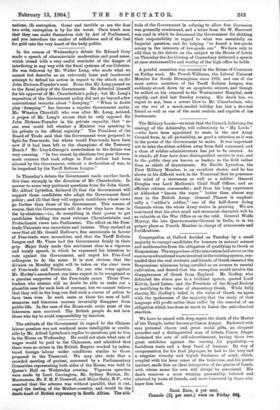The attitude of the Government in regard to the Chinese
labour question was not rendered more intelligible or credit- able by Mr. Alfred Lyttelton's replies to questions put to him in the House on Wednesday. He could not state what rate of wages would be paid to the Chinamen, and admitted that there were no mines in the British Empire worked by inden- tured foreign labour under conditions similar to those proposed in the Transvaal. We may also note that a crowded meeting of protest, convened by a Parliamentary Committee representing both sides of the House, was held in Queen's Hall on Wednesday evening. Vigorous speeches were made by Lord Carrington, Mr. Sydney Buxton, Dr. liacnamara, Mr. F. H. P. Creswell, and Major Seely, M.P., who asserted that the scheme was without parallel, that it out. raged the feeling of the Mother-country, and would be the death-knell of British supremacy in South Africa. The atti. tude of the Government in refusing to allow free discussion was generally condemned, and a letter from Sir W. Harcourt was read in which he denounced the Government for shirking their responsibility in regard to what was essentially an Imperial question, and for helping "to found a low-grade colony in the interests of low-grade ore." We have only to add that in the debate on the subject in the House of Lords on Thursday the Archbishop of Canterbury delivered a speech at once statesmanlike and worthy of the high office he holds.






































 Previous page
Previous page